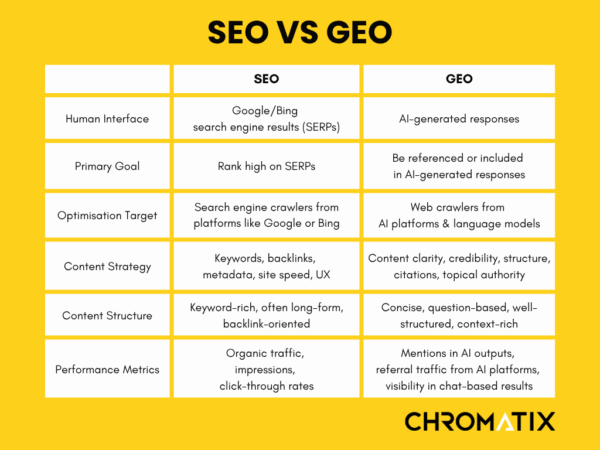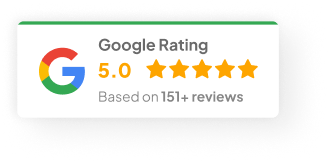28 Apr 25
GEO (Generative Engine Optimization): What Does That Mean?
The way people search for information is changing. Fast.
Instead of scrolling through endless search results, more and more people are turning to AI-powered tools like ChatGPT, Google Gemini, Perplexity, and Claude to get direct answers.
That’s where Generative Engine Optimization (GEO) comes in.
It’s the next big thing—and if you want your content to stay visible in a world driven by AI-generated responses, you need to get ahead of it.
In this blog, we’ll break down exactly what GEO is, why it matters, and how you can start using it to your advantage.
What is GEO?
Think of GEO as the modern cousin of SEO.
While SEO helps you rank on Google’s search pages, GEO helps you get your content picked up and quoted directly in AI-generated answers.
In other words:
-
SEO = Appear in search results.
-
GEO = Become the source AI engines rely on.
As AI tools continue to shape how people search, GEO is becoming critical for businesses and content creators who want to stay in the conversation.
Why GEO Matters Now
The way people search for things is changing. Seriously, reports are showing that almost 40% of Millennials are using AI-powered tools daily. And it’s not just for small talk—they’re using ChatGPT, Perplexity, and Gemini to make real decisions, get recommendations, and find answers.
Generative AI is now the gatekeeper of information. It gathers data from all over the web and delivers it to users in quick, digestible pieces. You won’t be jumping between five websites to get the info you need anymore—it’s all right there, thanks to AI engines.
How Generative Engines Surface Content
Generative engines aren’t just scanning for keywords—they’re looking for meaning. These engines use something called embeddings to understand the context of content, which is a bit different from traditional search engines. Here’s what they really care about:
-
Contextual relevance: Your content has to answer questions directly and clearly.
-
Credibility: AI engines love authoritative sources, expert voices, and citations.
-
Structured content: Headings, bullet points, and a clear layout help AI engines process your content.
-
Freshness: If your content is up-to-date, it gets priority.
Think about it this way: AI doesn’t always link back to your site. Instead, it pulls from the best content. If your stuff is clear, credible, and well-structured, it’s way more likely to show up in AI-generated answers.
How to Do Generative Engine Optimization
Want to get your content featured in AI-generated answers? Here’s the playbook:
1) Build Your Authority
Generative AI loves content from trusted sources. To get noticed, you’ve got to be everywhere—not just on your own site, but across the web. Get featured on:
-
High-authority websites
-
Podcasts and expert panels
-
Media outlets and whitepapers
These signals of credibility will help AI engines trust your content more.
2) Use Stats and Expert Quotes
AI engines are looking for facts. They want data and verified insights. So, instead of saying something like, “Video marketing is huge,” try:
“According to Wyzowl’s 2024 Video Marketing Report, 91% of businesses now use video as a marketing tool.”
Numbers like that make your content stand out and increase the chance it’ll get picked up by AI.
3) Write for Search Intent
GEO isn’t just about keywords—it’s about answering the real questions people have. There are different types of search intent to focus on:
-
Informational: People are looking to learn. (“How does solar energy work?”)
-
Commercial: They’re comparing options. (“Best solar panels for 2025”)
-
Navigational: They want a brand. (“Tesla solar reviews”)
-
Transactional: They’re ready to buy. (“Buy solar panels near me”)
Understanding this intent helps you create content that directly addresses what people are searching for.
4) Structure Your Content for AI
AI isn’t just looking for words—it’s looking for clarity. To make sure it notices your content, use:
-
Headings that summarise key points
-
Bullet points and numbered lists
-
Short, punchy paragraphs
-
Q&A formats when possible
The easier it is for AI to read, the better your chances of being featured.
5) Link to Credible Sources
AI loves linking to trusted sources. So, link to high-quality resources, like:
-
Industry reports
-
Government publications
-
Peer-reviewed studies
But stay clear of spammy sites. You want reputable sources, not random blogs.
6) Distribute Your Content
Getting picked up by AI means your content needs to be everywhere. Here’s where to focus:
-
Participate in discussions on Reddit, Quora, and Stack Exchange.
-
Build backlinks from high-authority sites.
-
Share your content on social media regularly.
The more visible your content is, the better.
7) Leverage Social Proof
AI engines pull from user-generated content, too. Real reviews and community discussions are valuable. So, get your customers to leave reviews, answer questions on forums, and join in relevant conversations. This kind of content can help AI engines discover your work.
8) Keep Your Content Fresh
Outdated content doesn’t make the cut. Keep your stuff up-to-date by:
-
Updating statistics and examples.
-
Refreshing case studies and adding new expert quotes.
The fresher your content, the better your chances of being featured.
GEO vs SEO
SEO has been the backbone of digital visibility for years. It’s how you get your site to the top of search results. But now, with AI on the rise, GEO is becoming just as important.
Here’s how they compare:
SEO: Helps humans find your website.
GEO: Helps machines reference your insights.
With GEO, the focus shifts from keyword rankings to being the answer that AI engines pull from. You’re not just trying to show up in a list of search results—you’re aiming to be the definitive answer.
Will GEO Replace SEO?
Nope. SEO’s not going anywhere. People still search. Google’s still one of the biggest players. That’s not changing anytime soon.
But what is changing is how people actually find and use information. More and more, they’re relying on tools like ChatGPT to get quick, straight answers—without ever clicking on a search result.
So, the game’s shifting. It’s not that SEO is dead—it’s just that it’s no longer the whole story.
Now, it’s about balancing both. You still need the solid SEO foundations—ranking on Google still matters—but you also need to think about how your content shows up inside generative engines.
You’ve got to create stuff that’s easy for people to find, easy for AI to pull into its answers, and actually useful when it gets there.
Wrap Up
If SEO helped you dominate Google, GEO could be the key to owning AI-driven search. The digital landscape is evolving fast, and the businesses that will thrive are the ones who can adapt.
Take a look at your existing content. Is it clear? Credible? Would an AI assistant trust it enough to feature it in an answer? Because, in the end, you’re not just writing for people anymore. You’re writing for the machines they trust.



